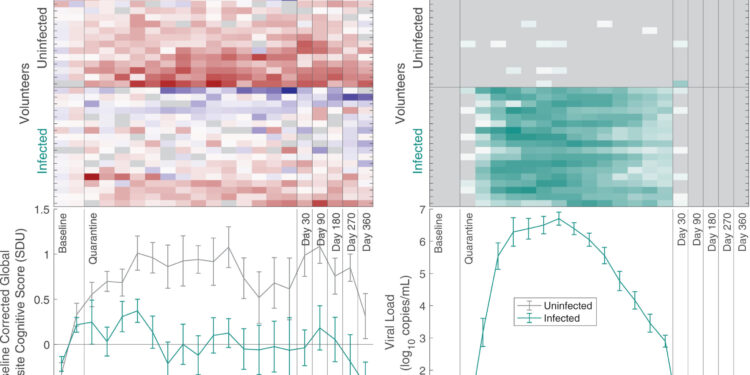Cognition and viral load of volunteers during the study period. Cognitive scores and viral load. A) baseline corrected cognitive scores and B) viral load during the baseline phase, quarantine phase, and follow-up time points. The top graphs show individual volunteer data, ranked within the group by average cognitive score for all phases. The lower graphs show the average data for the infected (green) and uninfected (gray) groups, with error bars representing the standard error of the mean. Credit: eMedicineClinical (2024). DOI: 10.1016/j.eclinm.2024.102842
A new analysis of Imperial’s COVID-19 human challenge study found subtle differences in the memory and cognition scores of healthy volunteers infected with SARS-CoV-2, which lasted until one year after infection.
The researchers say all scores were within normal ranges expected for healthy individuals and no one reported experiencing lasting cognitive symptoms such as brain fog.
The results, published in the journal eMedicineClinicalshow a small but measurable difference following very intensive cognitive testing of 18 healthy young people who were infected compared to those who were not infected, followed under controlled clinical conditions.
The team explains that incorporating such sensitive cognitive tests into future studies could help reveal more detailed information about how infections can impair brain function and could help find ways to reduce these processes when they cause symptoms.
Lead author Professor Adam Hampshire, from the Department of Brain Sciences at Imperial College London and now based at King’s College London, explained: “We know that COVID-19 can have lasting impacts on our memory and our ability to perform common cognitive tasks. , much of the scientific evidence we have comes from large-scale studies based on self-testing and reporting, or where there are a range of variables that could increase or reduce these effects.
“Our work shows that these cognitive effects reproduce even under carefully controlled conditions in healthy individuals, including infection with a comparable dose of virus, and further highlights how respiratory infections can impact specific aspects of brain function.
“We were only able to detect some of these effects because of the trial design, which used highly sensitive tests and controlled conditions, with participants’ performance compared to their own baselines before inoculation This allowed us to detect subtle changes that the participants themselves did not seem to be aware of.
COVID-19 and cognition
Previous studies including patients with a wide range of severities have shown that COVID-19 can have a lasting impact on people’s brain function. One such study, led by Imperial and involving more than 140,000 people, found mild deficits in performing cognitive and memory tasks in people who had recovered from COVID-19, with differences evident one year or more after infection.
In the latest study, researchers analyzed results from a small group of healthy volunteers who were part of the first global human challenge study for COVID-19 in 2021. The results reveal subtle differences in how they performed. performed the same tests, which lasted up to 12 months, although subsequent tests may have been affected by other subsequent factors.
During the trial, 36 healthy young participants, without any prior immunity to the virus, were infected with SARS-CoV-2 and followed under controlled clinical conditions. They were closely monitored and remained at the facility until they were no longer contagious. In the group, 18 participants were infected and developed mild illness, including one without symptoms.
Participants also completed sets of tasks to measure several distinct aspects of their brain function, including memory, planning, language and problem solving, using the Cognitron platform. Participants took the tests before being exposed to the virus, during the two weeks they spent in the clinical facility, and then repeatedly over a period of up to a year.
The analysis showed that those who were infected with SARS-CoV-2 had statistically lower cognitive scores than uninfected volunteers – compared to baseline scores – during their infection as well as during the follow-up period. The main score differences were observed in memory and executive function tasks (including working memory, attention, and problem solving).
Differences in scores between groups were observed up to one year after infection, with the uninfected group performing better overall on the tasks.
The researchers note that the observed differences were small and none of the volunteers reported prolonged cognitive symptoms. They also point out limitations of the study, including the small sample size and the fact that the majority of participants were white men. Caution should therefore be exercised when extrapolating results to the general population.
They explain that future research could examine the biological links between respiratory infection and cognition in COVID-19, and even show how this impact compares to other conditions, like respiratory syncytial virus (RSV) or the flu.
Co-author Professor Christopher Chiu, from the Department of Infectious Diseases at Imperial College London, who led the COVID-19 human challenge study, said: “These latest results from our study add finer details to the picture we have of COVID-19. and other respiratory infectious diseases.
“Challenge studies can offer a tool to help us better understand how infections disrupt a range of biological functions. Here, by showing biological effects below what might be considered symptoms or disease, we were able to identify the smallest changes in these pathways.
“This could ultimately help us develop new treatments to reduce or even block some of these effects, which we know in other contexts can have lasting impacts on people’s lives.”
More information:
William Trender et al, Changes in memory and cognition during the SARS-CoV-2 human challenge study, eMedicineClinical (2024). DOI: 10.1016/j.eclinm.2024.102842
Provided by Imperial College London
Quote: Study on COVID-19 human challenge highlights small changes in memory and cognition (October 4, 2024) retrieved October 4, 2024 from
This document is subject to copyright. Except for fair use for private study or research purposes, no part may be reproduced without written permission. The content is provided for informational purposes only.



